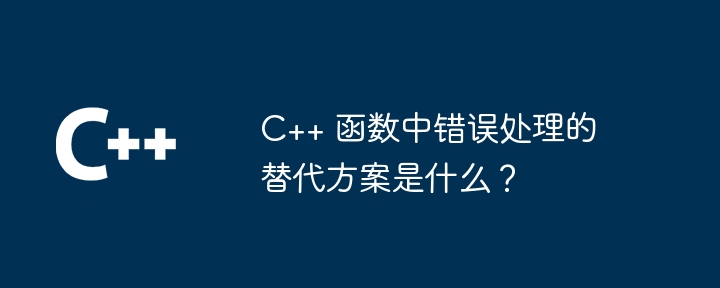
Alternatives to error handling: Exception mechanism: Use try-catch blocks to handle exceptions. The advantage is that it is easy to read, but the disadvantage is that it may lead to exception transmission; Error code: Use a specific value to indicate errors. The advantage is that the control is detailed, and the disadvantage is that The error code needs to be checked in the caller.

In C, there are basically two ways to handle function exceptions:
try and catch blocks to catch and handle errors. errno. Exception mechanism
try {
// 可能引发异常的代码
}
catch (std::exception& e) {
// 处理异常
}Advantages:
Disadvantages:
Error code
int myFunction() {
// 执行操作并设置错误码
if (条件) {
return -1; // 错误码
} else {
return 0; // 成功码
}
}Advantages:
Disadvantages:
Practical case
Suppose there is a readFile function, which may cause std::ifstream::failureException:
std::ifstream readFile(const std::string& filename) {
std::ifstream file(filename);
if (!file.is_open()) {
throw std::ifstream::failure("无法打开文件");
}
return file;
}Use exception mechanism:
try {
std::ifstream file = readFile("example.txt");
// 使用 file
}
catch (std::ifstream::failure& e) {
// 处理错误
}Use error code:
int result = readFile("example.txt");
if (result == -1) {
// 处理错误
} else {
std::ifstream file(result);
// 使用 file
}The above is the detailed content of What are the alternatives to error handling in C++ functions?. For more information, please follow other related articles on the PHP Chinese website!
 How to solve 0xc000409 error
How to solve 0xc000409 error
 How to solve the WerFault.exe application error
How to solve the WerFault.exe application error
 What are the differences between c++ and c language
What are the differences between c++ and c language
 Recommended learning order for c++ and python
Recommended learning order for c++ and python
 Cost-effectiveness analysis of learning python and c++
Cost-effectiveness analysis of learning python and c++
 Is c language the same as c++?
Is c language the same as c++?
 Which is better to learn first, c language or c++?
Which is better to learn first, c language or c++?
 The difference and connection between c language and c++
The difference and connection between c language and c++




